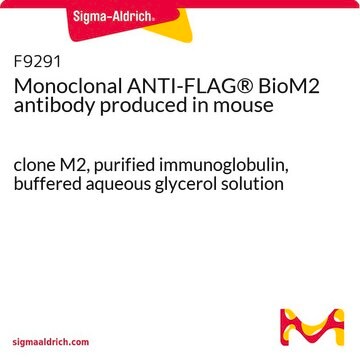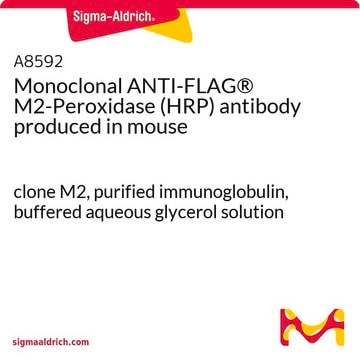B3111
ANTI-FLAG® M2 antibody, Mouse monoclonal
Clone M2, purified from hybridoma cell culture in bioreactor
Synonym(s):
Anti-ddddk, Anti-dykddddk, M2 clone ANTI-FLAG
Sign Into View Organizational & Contract Pricing
All Photos(7)
About This Item
UNSPSC Code:
12352203
NACRES:
NA.43
Recommended Products
biological source
mouse
antibody form
purified immunoglobulin (purified IgG1 subclass)
clone
M2, monoclonal
shelf life
4 yr
purified by
using Protein A
storage temp.
−20°C
General description
Monoclonal ANTI-FLAG M2 is a purified immunoglobulin, IgG1, monoclonal antibody, purified from culture supernatant of hybridoma cells, that binds to FLAG® fusion proteins. Unlike ANTI-FLAG M1 antibody, the M2 antibody will recognize the FLAG sequence at the N-terminus, Met-N-terminus, C-terminus, or at an internal site of FLAG fusion proteins. Monoclonal ANTI-FLAG M2 is useful for identification and capture of FLAG fusion proteins by common immunological procedures such as Western blots and immunoprecipitation. It is also useful for affinity purification of FLAG fusion proteins when bound to a solid support.
form: solution pH 7.4, containing 15 mM sodium azide
concentration: 3.0-5.0 mg/mL
form: solution pH 7.4, containing 15 mM sodium azide
concentration: 3.0-5.0 mg/mL
Application
IB, IF, IP, FACS, ELISA
Antibody is recommended for use in several applications such as immunoblotting, immunoprecipitation, immunofluorescence, flow cytometry, and ELISA.
Learn more product details in our FLAG® application portal.
Antibody is recommended for use in several applications such as immunoblotting, immunoprecipitation, immunofluorescence, flow cytometry, and ELISA.
Learn more product details in our FLAG® application portal.
Packaging
polypropylene screw cap vial
Preparation Note
Dilute the antibody solution from 0.5-10 ug/mL in specified buffer
Legal Information
ANTI-FLAG is a registered trademark of Merck KGaA, Darmstadt, Germany
FLAG is a registered trademark of Merck KGaA, Darmstadt, Germany
Storage Class Code
12 - Non Combustible Liquids
WGK
nwg
Flash Point(F)
Not applicable
Flash Point(C)
Not applicable
Certificates of Analysis (COA)
Search for Certificates of Analysis (COA) by entering the products Lot/Batch Number. Lot and Batch Numbers can be found on a product’s label following the words ‘Lot’ or ‘Batch’.
Already Own This Product?
Find documentation for the products that you have recently purchased in the Document Library.
Arturo Roca-Rivada et al.
JCI insight, 9(9) (2024-05-08)
The importance of the proper localization of most receptors at the cell surface is often underestimated, although this feature is essential for optimal receptor response. Endospanin 1 (Endo1) (also known as OBRGRP or LEPROT) is a protein generated from the
Xin Wu et al.
mBio, 13(2), e0040222-e0040222 (2022-03-29)
Severe acute respiratory syndrome coronavirus 2 (SARS-CoV-2) infection triggers cytokine-mediated inflammation, leading to a myriad of clinical presentations in COVID-19. The SARS-CoV-2 open reading frame 8 (ORF8) is a secreted and rapidly evolving glycoprotein. Patients infected with SARS-CoV-2 variants with
Lirong Xu et al.
Cell reports, 39(2), 110635-110635 (2022-04-14)
Circadian genes such as Clock, Bmal1, Cryptochrome1/2, and Period1/2/3 constitute the precise circadian system. ClockΔ19 is a commonly used mouse model harboring a circadian clock gene mutation, which lacks the EXON-19-encoded 51 amino acids. Previous reports have shown that ClockΔ19
Runming Zeng et al.
Experimental biology and medicine (Maywood, N.J.), 246(6), 644-653 (2020-12-11)
Osteoarthritis (OA), the most prevalent form of arthritis disease, is characterized by destruction of articular cartilage, osteophyte development, and sclerosis of subchondral bone. Transcription factors Janus kinase 1/signal transducer and activator of transcription 3 (JAK1/STAT3) and Forkhead box M1 (FOXM1)
Rui Santalla Méndez et al.
Cellular and molecular life sciences : CMLS, 80(10), 306-306 (2023-09-27)
Intracellular vesicle transport is essential for cellular homeostasis and is partially mediated by SNARE proteins. Endosomal trafficking to the plasma membrane ensures cytokine secretion in dendritic cells (DCs) and the initiation of immune responses. Despite its critical importance, the specific
Our team of scientists has experience in all areas of research including Life Science, Material Science, Chemical Synthesis, Chromatography, Analytical and many others.
Contact Technical Service








